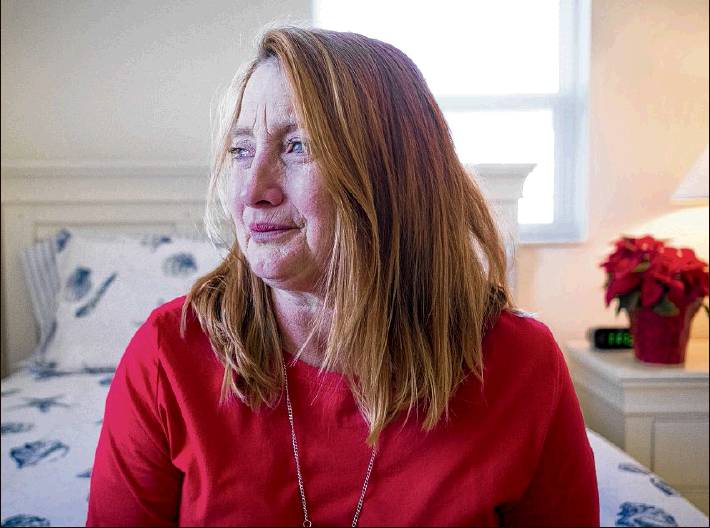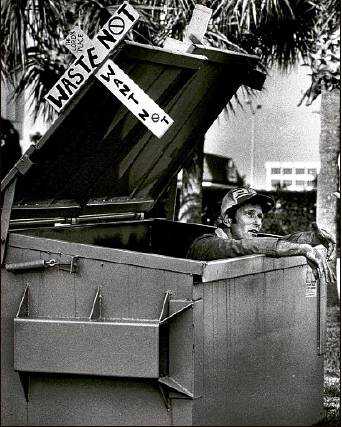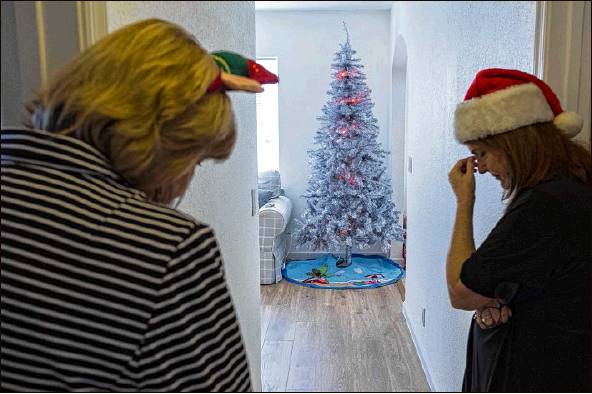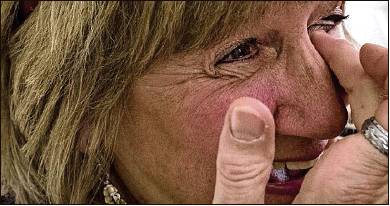POST COVERAGE THE LORD’S PLACE
The Lord’s Place helping people heal for 34 years
Brother Joe’s dream endures, expands over the decades.
By Sonja Isger Palm Beach Post Staff Writer
WEST PALM BEACH — Robyn Kennedy, a 52-year-old once-homeless woman, never met “Brother Joe.” She was just completing high school when he decided in 1983 that hosting a soup kitchen wasn’t enough and then camped on the steps of St. Ann Catholic Church for a month to raise $100,000 to put the homeless up in a barely renovated motel.
Brother Joe was long gone from the county when Kennedy and her daughter hit that rough patch that left her without a job and nowhere to call home.
But the charity he started and that hundreds of volunteers, donors and employees have nurtured ever since has become one of the county’s significant players when it comes to helping people rise out of homelessness: The Lord’s Place.
This holiday season, Kennedy and her 12-year-old daughter, Angel, are celebrating in their new home with a silver Christmas tree, thanks to the generosity of a local church and the efforts of The Lord’s Place.
Kennedy has been working for a couple of years to get here — to have a job, a car and a place she can afford to rent, one that will allow her to save enough to one day buy her own home.
She’s one of thousands in the past 34 years to lean on The Lord’s Place to steady her path.
Folks called Joe Ranieri “brother,” but it was just an informal title for the man who was a deacon, a layman, at St. Juliana Church in West Palm Beach. Ranieri was driven by the fate of his own brother, who was mentally ill and homeless and froze to death one night on a Brooklyn street.
Ranieri began his homeless outreach by opening a soup kitchen in West Palm’s north end.
“He’d feed lunch to anyone who came in, no questions asked. He would engage with whoever came in and try to address what issues they had,” said longtime friend Jack Scarola. “It became obvious that people in the community were in very great need — beyond a cup of soup and a sandwich.”
Ranieri, then 43, wanted to give them a place to stay, somewhere to land for six weeks while they worked and socked away money for a place of their own. He wanted to buy a 15-unit motel on Broadway — but the asking price was $285,000.
Scarola doubted Ranieri could pull it off, and he was not alone.
“We told Joe it was very unlikely he was going to succeed. ... He didn’t have the money. He’d have a hard time getting zoning. We urged him to direct his focus someplace else,” Scarola said. “Joe insisted that this was something that could be done and would be done. So reluctantly, we decided to help Joe in his efforts.”
Ranieri’s efforts kicked off with a bit of PR.
He would call attention to the homeless by living like them in the middle of downtown, at the corner of South Olive and Second Street, for a month. He would eat one meal a day from his soup kitchen. Sleep on the steps of St. Ann. And shower daily nearby — if you’re collecting donations, it’s best not to stink, Ranieri told reporters at the time.
His constant companion, a sign that read: Help. I am living in the streets to gain support for a family shelter “The Lord’s Place” P.O. Box 7117 W. Palm Beach, Fl – 33402
Brother Joe was visited by politicians, the state attorney, a radio talk show host and everyday residents.
He raised $100,000 — $25 donations were common; so was pocket change. The largest donation was $12,000. Schoolchildren took up collections; volunteers at the kitchen raised a bit more selling carnations on Mother’s Day. Palm Beach artist Edna Hibel donated a limited edition ceramic plate that was raffled off for a buck a ticket.
Sunburned and maybe 7 pounds lighter, Ranieri ended his vigil May 17, 1983, and by July 11, three families had moved into the converted Southwind Motel. Luis and Rakel Martinez had been living in their 1972 Subaru since Luis lost his job six months earlier. Michael and Sydnee Hawks and their 5-month-old had lived three days in their 1974 Lincoln. He had been working at a convenience store until the chain folded. Joe got him work selling cable and her a job at a restaurant.
The rules were simple: Stay six weeks for free but deposit 75 percent of your earnings into a savings account. No visitors. No alcohol. No drugs. No parties. No weapons or excessive noise. Lights out by 10 p.m. And if we find you a job, you must take it. (The first family to arrive at The Lord’s Place had to leave a day later because they rejected a job offer, The Miami Herald reported.)
A year later, The Lord’s Place reported 141 families had found temporary shelter with them — and Brother Joe was out once again, this time living in a trash bin outside Scarola’s office on Palm Beach Lakes Boulevard, hoping to raise $25,000 worth of food for needy immigrants.
By 1985, Ranieri had his sights set on building a sister campus in Boynton Beach.
“As it turns out, Joe had a remarkable talent for attracting public attention,” said Scarola, who had slept on the steps of St. Ann with Ranieri at least once and later spelled him occasionally in the trash bin.
During the next decade, the so-called “Beggar of Palm Beach” — a title he gave his self-published book about his adventures — grew The Lord’s Place into a string of shelters for homeless families. His name became synonymous with the charity that could boast $1 million in annual revenues and $4.7 million in assets.
In 1995, Ranieri finally called it quits.
“I think it’s set up now where it can move ahead without me. No one person is the institution. The Lord’s Place has always been a community effort,” he told The Palm Beach Post, noting that his next stop was retirement, possibly in the Carolinas.
In those days, no one officially counted the county’s homeless though Ranieri said publicly that he suspected there were certainly hundreds. By 1998, estimates ran from just short of 2,000 to well more than 3,000 in Palm Beach County.
Today, the federal government requires that the counting be done more regularly and systematically. In March, that count turned up 1,607 homeless people and families, up 11.5 percent from two years earlier. Despite the raw number climbing, the inventory also revealed the number of people chronically homeless and the number of homeless veterans were both down significantly.
Five years ago, the county opened a homeless assessment center, the Senator Philip D. Lewis Center on 45th Street, which serves as a triage, interviewing the region’s homeless and directing them to the myriad of services offered by more than 65 agencies, including The Lord’s Place.
“They’re one of the leaders. They do an excellent job,” said Marilyn Munoz, executive director for the county’s Homeless Coalition.
In 2016, 337 people, including 51 families, stayed in housing provided by The Lord’s Place on one of its seven properties.
No longer focused solely on families, the charity runs homes for single women, women just out of incarceration, a campus for families and another for single men, including those recovering from substance abuse. It also offers graduate housing for people who are ready to begin paying rent while they engage in programs that make them better employees and homeowners.
The programs are what have extended The Lord’s Place’s reach to the point that the charity boasts serving 1,600 people in 2016, according to its internal reports.
“All the homeless service providers have their niche. What I love about what they do is their social enterprise, like what they do with the café,” Munoz said.
Brother Joe began by feeding the homeless. Now the homeless feed others.
The Lord’s Place runs Joshua Catering Company — and Joshua Thrift Store — to give its once homeless clients job experience. They hone their skills, build their resume, and make a bit of cash for both themselves and the charity — just less than $1 million or 12 percent of The Lord’s Place revenue.
The charity reports just more than $8 million total revenue, including $2.1 million from government grants and $3.6 million in contributions. On the other side of the ledger, it reports $7.7 million in expenses, including $3 million for housing and $1.6 million to run the catering and thrift business.
Their network proved to be what Robyn Kennedy needed when she lost her job managing apartments and then couldn’t afford her own. Mother and daughter became nomads staying with friends until she connected with The Lord’s Place and was allowed to move into a two-bedroom, two-bathroom apartment on its family campus.
Kennedy was assigned a case manager and a job coach. She volunteered for the youth center on campus, worked the front room at the Joshua Café. She enrolled in the job training, parenting and self-esteem classes. Within weeks, she had a paying job with Friends of Palm Beach, a charity that picks up trash on the island’s shores.
“They put me in a safe environment. They helped me heal. When I got here, I was broken,” said Kennedy, who is now in charge of a crew at work and is studying to sell real estate.
“People think homelessness is complicated. It’s not necessarily complicated,” said Diana Stanley, CEO of The Lord’s Place for the past decade. “You can give them a home. The complication is maintaining.” That means seeing that clients know how to stay healthy, physically and mentally, keep a job, stay out of debt. And that’s where the charity has grown in her tenure.
One thing that hasn’t changed? The name.
“The issue has arisen on more than one occasion,” acknowledges Scarola, a board member. “The thought has been there’s potential contributors who might be put off by the name of the organization and that we ought to have broader appeal. Those efforts have been resisted.”
Years ago, the charity did remove the cross from its logo, Scarola said. “That’s in recognition that we’ve received wonderful support and continue to receive wonderful support from non-Christian members of the community. We want to be inclusive as we can, but we don’t want to abandon the spiritual component of the work that we do.”
They asked Stanley what she thought when she arrived.
“I said, ‘You don’t need to change the name. Our job is not to change the name. Our job is to build programs and services of excellence that the name should be synonymous to an agency that is dedicated to ending homelessness.’” sisger@pbpost.com



